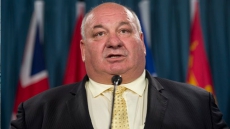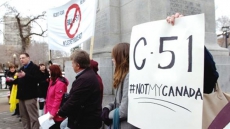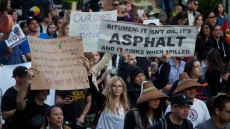OTTAWA — The cost of providing medical marijuana to the country's injured soldiers under a Veterans Affairs program jumped to more than $4.3 million this fiscal year, an increase of 10 times what was spent last year.
And the number of ex-soldiers eligible for taxpayer-funded, prescribed pot more than quadrupled to 601 patients, according to figures released by the department.
The numbers represent a dramatic escalation, even from last fall, when former veterans minister Julian Fantino was told in a briefing note that there were 224 approved cases.
At the beginning of the last budget year there were 116 eligible veterans.
In 2013-14, the government spent $417,000 on medical marijuana for soldiers, said the briefing obtained by The Canadian Press under access to information legislation.
The jaw-dropping increases may represent a conundrum for Health Canada, which routinely warns against marijuana use, and the ruling Conservatives who have ridiculed Liberal Leader Justin Trudeau's campaign for overall legalization of marijuana.
In a statement, a Veterans Affairs spokeswoman stood by the program, pointing to government documents explaining that even though the government does not want to see marijuana used as medicine, the courts have ordered patients to have access to it if prescribed.
"Marijuana for medical purposes is not an approved drug or medicine in Canada and Health Canada does not endorse or promote the use of marijuana," said Janice Summerby in an email. "However, (Veterans Affairs) will support eligible veterans by reimbursing the cost of marijuana for medical purposes if their physician deems it is an appropriate treatment for the veteran's health condition and authorizes its use in accordance with Health Canada's regulations."
Throughout much of last year, there was a growing debate within the veterans department about how much would be covered by the program, introduced in 2008, and whether it should be capped or even cancelled outright.
Fantino, who has since been replaced by Erin O'Toole as minister, was presented with four different options, including dropping the policy, but retaining existing clients; or eliminating it altogether.
In a pamphlet sent to constituents last year, Fantino claimed Trudeau wants to “make buying marijuana a normal, everyday activity for young Canadians” and even charged that the Liberal leader wants to allow the sale of pot in corner stores.
At the same time, Health Canada — which oversees the country’s burgeoning medical marijuana industry — is running ads saying: “The science is clear. Marijuana use equals health risks.”
Clayton Goodwin, a former reservist who was injured in the Far North in 2004, said the mixed messages make it hard to get pot prescribed by a doctor, even though medical marijuana has been legal since 2001.
"The personal stigma and shaming of an individual's choice of medicine is something that needs to be addressed," said Goodwin, who noted that a group run by an ex-combat engineer in New Brunswick — Veterans Helping Veterans: Marijuana for Trauma Inc. — is helping pair veterans with doctors who will prescribe marijuana.
He said many veterans with chronic pain, anxiety and post-traumatic stress are choosing medicinal pot over pharmaceuticals for safety and to get away from some of the side effects of prescription drugs.
Goodwin agreed that the price of anywhere between $9 and $15 per gram was too high, but blamed the government.
"Right now, normal Canadians, never mind veterans, do not have enough access from the licensed producers from the program that's been put in place to supply us our medication because (the government) hasn't licensed enough of them and they are taking on too many consumers," Goodwin said.
Cancelling or capping the program, especially in an election year, could further anger an already incensed veterans community.
The debate at Veteran Affairs started in earnest last spring after Health Canada introduced regulatory changes that limited its role to overseeing the rules and licensing of private producers.
"There are no longer any health criteria to be met and fewer controls over who can prescribe," said the Oct. 20, 2014 briefing note to Fantino. "New regulations do not speak to quantity limits or pricing of marijuana."
Before the change, Health Canada provided eligible veterans with marijuana at a fixed price of $5 per gram, but private growers can now charge what the market will stand.
Health Canada guidelines suggest individuals should limit their consumption to five grams per day, while the College of Family Physicians of Canada suggests three grams.
Right now, eligible veterans can receive up to 10 grams of pot per day. Requests for higher amounts are reviewed on an individual basis by department bureaucrats as long as a doctor provides a written rationale.




